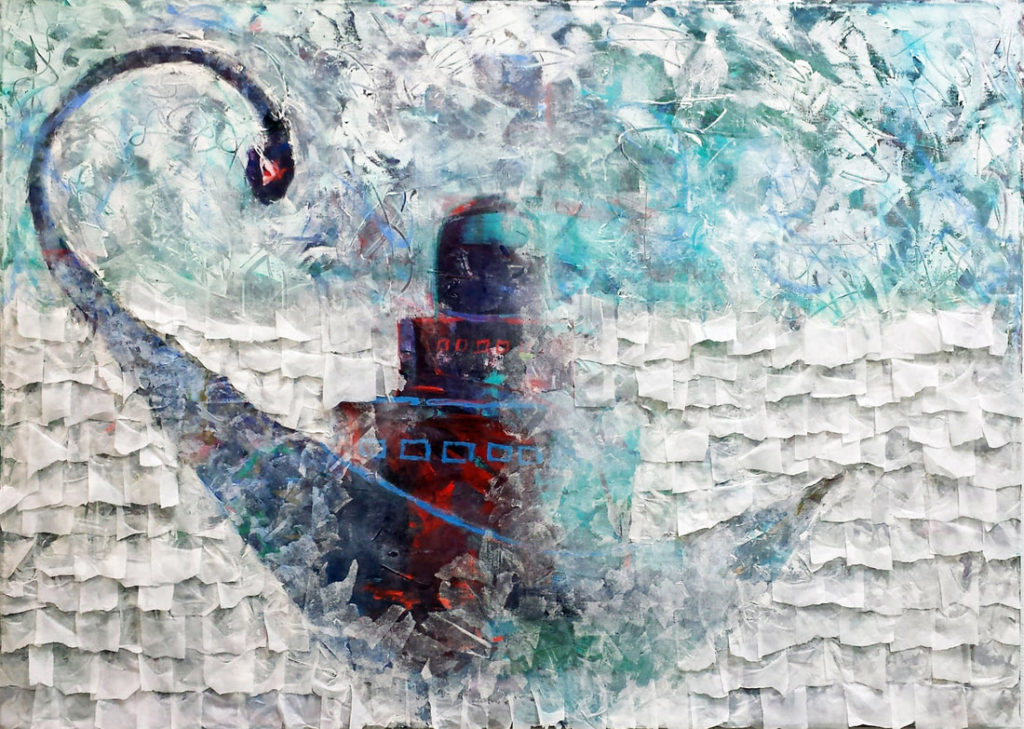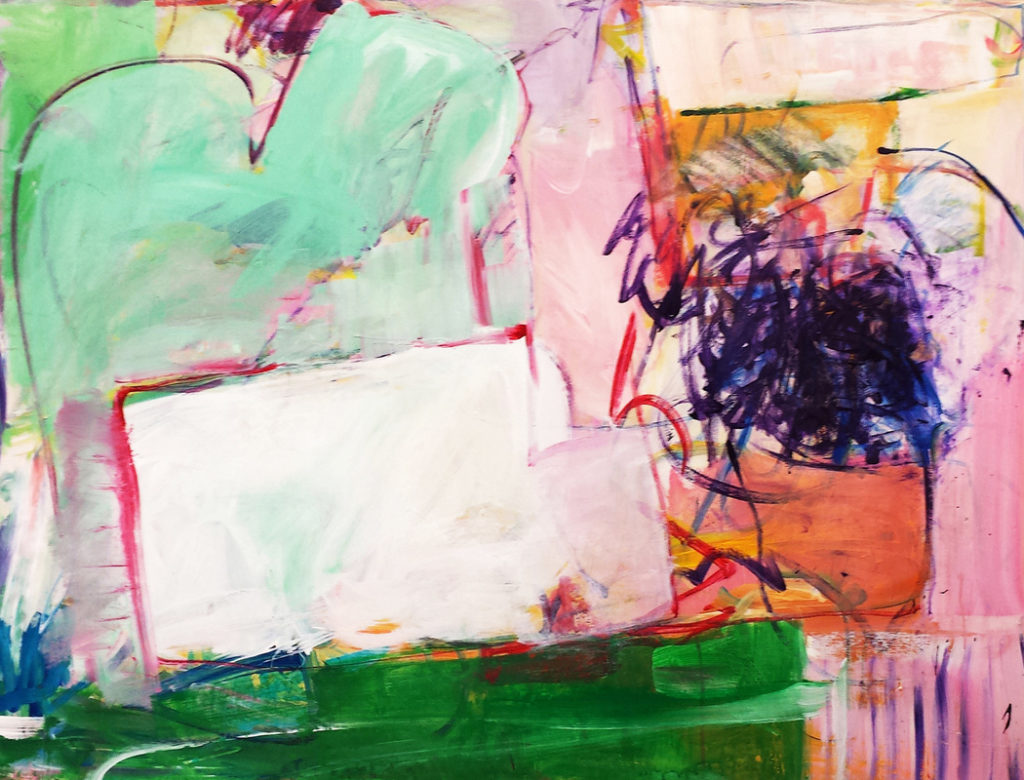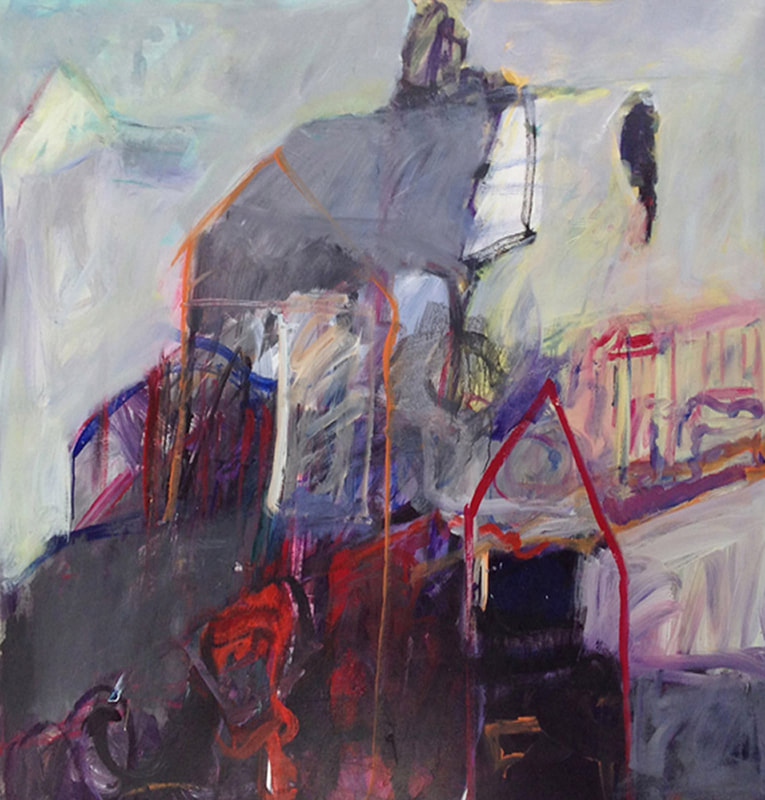
“Aladdin, Fogged In” by Kathy O’Meara
Van Vleck Street is two blocks long, barely 100 yards. It’s cut into a hill that’s broken up by North Mountain Avenue and bookended by Upper Mountain Avenue and Valley Road, both busy one-lane streets. I was in my mother’s 2006 Ford Escape—black vents shot stale air.
It was late September. The leaves on the overhanging oak trees radiated in the sun like Christmas ornaments and the evergreens towering over the Van Vleck Garden looked like umbrellas God placed to protect the plants hidden beneath.
I was coming from a therapy session.
Before that, I’d come from Boston.
I had finished three weeks of the fall semester of my senior year at Northeastern University.
On the 20th, five days before driving up Van Vleck, I’d finally fallen asleep after being awake for 40 hours straight.
On the evening of the 19th, I had rushed into Emmanuel Church on Newbury Street right by the Boston Commons. The sanctuary was hushed. There was only a woman’s voice: deep, resonant, and lighthearted. Wishing to not draw attention to myself after entering the gothic hall fifteen minutes into the AA meeting, I hurried to a seat in the third-to-last row of folding chairs.
I surreptitiously turned my phone off and placed my book bag on the floor. Picking my head up to put a face to the voice, I saw a dense, curly mop of brown hair two rows in front of me. It matched the hair of one of my ex’s, Tory. For a breath, I thought it was her. What a relief that would’ve been! Since our break-up, Tory had become a source of strength, a never-ending stream of encouragement. She’d become a medium and whenever I saw her, she would speak of visions she had of me, both joyful and harrowing. She was genuine, expressive, showing off her curiosity, gullibility, and vivacity through her readings.
But the head of hair was seated next to Deborah, Gabi’s roommate.
The recognition of Gabi, my estranged ex-girlfriend, made my toes feel like they were freezing over, detaching from my feet. Then my forearms felt hollow as though the blood and bone had been sucked out, and this led to a lack of circulation in my hands. They felt heavy, sore, pins and needles on the pads of my fingers.
My mind tumbled towards fantasies of embarrassment, shame, separation. I tried to focus on the bronze statues and golden pipes at the front of the cathedral but my attention kept getting pulled back to tangents of grandiose failure: all the times I’d treated Gabi poorly, the nights spent alone in my apartment listening to the raging sound of a drum set coming from an opened window behind my building.
At the end of the meeting, the chairperson asked for everyone to take a moment to introduce themselves to their neighbors, just like at mass. I turned backwards to avoid looking at Gabi. I shook hands with two strangers.
The chairperson then opened the room up for any AA-related announcements. The meeting’s secretary, Devon, spoke up from two rows behind me. I didn’t want to wrench myself around to look at him, so I gazed forward above the back of Gabi’s head. But halfway through his share, Gabi turned around. We didn’t make eye contact, but we were in each other’s line of sight. It’d been four months since I had a clear look at her face. It was transparent, waxed over, giving a glimpse into the brilliant, inquisitive, and tragic mind it protected.
I tried to make eye contact. Why? To prove to her that I still existed? To prove that she couldn’t will me away? To punish myself further?
~
I didn’t sleep that night.
I was restless.
Energized.
Ecstatic.
Manic.
A flip had been switched somewhere inside me. Was it a dopamine dump? Serotonin? Adrenaline? I’m not familiar with the makeup of a bipolar brain, but mine certainly underwent some chemical change.
Alone in my apartment, I laughed at my own jokes, paced ceaselessly around my bedroom, and talked to the empty space in a whisper because I knew that the way I was acting wasn’t normal.
Quickly, though, I got fed up with my stifling room. I tramped outside into the darkened evening—it was nearing 1am. A torn-up couch sat in desolation on the sidewalk. I ran across it length-wise, leaping as high as I could off the couch and onto the sidewalk, landing garishly—a flick of the wrist, an arm extended to the sky, chin dipped to my chest.
Down the block I found a stray cat, one I’d rarely seen in the daytime but that had always been surprisingly friendly. It was an orange tabby with one eye and a confident saunter—never veering from its set path.
It approached from the opposite side of the street, crossing under the streetlights and into an empty corner lot. The lot was twelve feet square, boxed in by by two four-story homes, each containing twenty residents. I followed the cat into the lot, calling it all the cat names I could think of, hoping I’d strike gold, “Mittens! Snowball! Tiger! Kitty! Poopsie! Meowzerz!”
I could see shapes moving behind backlit windows of the neighboring buildings and hoped that they’d come outside and join me.
After one more Kitty!, the cat sprawled on the pavement, paws stretched above its head, stomach exposed: the sign of complete acceptance. I scratched its temple, lifted it up, and hoisted it over my shoulder. I then carried Scrooge (I’d named it Scrooge) down Mission Hill towards Tremont Avenue. A woman passed us halfway down the hill: a beleaguered college student that took long strides and kept her head down. I raised Scrooge a few inches and called, “Say hi to Scrooge!”
I placed the cat on the sidewalk at the bottom of the Hill and told it to wait while I entered a convenience store to buy it some ham.
I burst into a 7/11 and stalked the aisles with jaguar-like zeal. I spoke quickly at the register, telling the clerk about the cat in loud peaks and soft ramblings as I tried to explain to us both what Scrooge and I were going to do for the rest of the night. The clerk nodded politely and let me leave without saying goodbye.
When I came out, Scrooge was gone.
~
The mania lasted almost 24 hours. This was typical for me. Suffering from bipolar II, I experience hypomanic episodes, which reach the same emotional intensity as a traditional manic episode, but are less frequent and rarely stretch past 72 hours. Similar to those afflicted by bipolar I, though, those suffering from bipolar II experience steady depressive episodes for an extended period of time.
I sat in my Introduction to Shakespeare class the following afternoon as the mania finally crept out of my body. My eyelids grew heavy and tears formed behind my lids—burning like pinpricks. My breathing became inconsistent—rapid breaths followed by long, intentional ones. My upper body felt heavy; my posture rounded.
I couldn’t concentrate. I tried to put my thoughts together in order to understand what was happening to me what is causing this but A wouldn’t lead to B and B wouldn’t lead to C—they floated separate from one another like planets orbiting the sun.
Outside of class, Olivia asked if I was okay. I walked away shaking my head.
I stumbled across campus to the Spirituality Center where it took me half an hour to fall asleep. My nap wasn’t restorative and I awoke in a panic.
The next day I phoned home and told my parents that I needed to see them.
I saw my therapist in New Jersey on Sunday night, the 24th—God bless her. I confessed that I couldn’t finish the semester—I was losing control, I couldn’t contain myself, I couldn’t change the way I felt in a given moment. She applauded my honesty, but then hesitated, unsure how to proceed. She took a moment before speaking, eyeing my sordid posture with unease: I lay on my side across the beige leather loveseat in her office, looking vacantly towards her potted plants.
She suggested that I might need inpatient psychiatric treatment.
Drug treatment six years prior was supposed to be all the inpatient care I’d ever need. I was supposed to cured, living on the other side.
It felt like failure. Even with six years of routine therapy, active participation in Alcoholics Anonymous, and a prospering social and romantic life, I had reached a point where inpatient was again necessary.
That, I could not own.
~
Monday the 25th—Van Vleck Street.
I saw my therapist again in the morning to see whether my mood had stabilized overnight.
Mood instability, also known as mood cycling, is a feature of my bipolarity. My joy and devastation spike and rarely last more than a few days and never, at least not in recent memory, have I felt okay or even eh for a week straight.
The mood spikes are always precipitated by events, but these events hold smaller responses for those who are not bipolar. It could be said that I’m sensitive to a fault. I’m fatally sensitive. To both joy and sadness; I scare people when I get happy. I twitch. I’m easily irritated. I speak so fast that my sentences become incoherent. I trail after my thoughts like a kid holding a kite in a thunderstorm.
Driving on Van Vleck Street, I twitched and I was irritated.
It’s widely accepted that although those with dampening depressive symptoms may be in greater psychological pain, they are at a lesser risk for suicide than their energetic counterparts. When someone is so depressed that they cannot leave their bed, they cannot do much harm to themselves—they’re liable to stay in bed all day, lose their job, cut off relationships. But those with lesser psychological pain but greater energy are much more likely to act on their self-destructive impulses.
As I waited for an opening amidst the cars at the top of Van Vleck Street, an unsettling experience took over. I’d be remiss to describe it as an out-of-body experience, but that’s the most accurate colloquialism at hand.
Without actually doing it, I felt my foot slam on the gas pedal, launching me in front of the rushing cars. I watched my car get T-boned by an SUV, the driver’s side crumpling in on itself, throwing my body against the inner console and into the passenger’s seat, my head cracking the passenger’s window.
There was no sound.
No blood.
No pain.
No one else was hurt.
It was clean.
Perfect.
Like watching a film replace reality.
My therapist called me shortly after I turned onto Upper Mountain Avenue. There are few things I attribute to God, but her phone call is one of them. She said that she shouldn’t have let me leave her office that morning, that I was too much of a danger to myself. She suggested that I get into inpatient treatment as soon as possible.
I checked myself in the following afternoon.
Benjamin Selesnick is an undergraduate at Fairfield University and a reader for Memoir Mixtapes. His prose has appeared in decomP, Literary Orphans, The Bitter Oleander, Parhelion Literary Magazine, and others. In 2017, he was the runner-up for the Stony Brook Short Fiction Prize.









